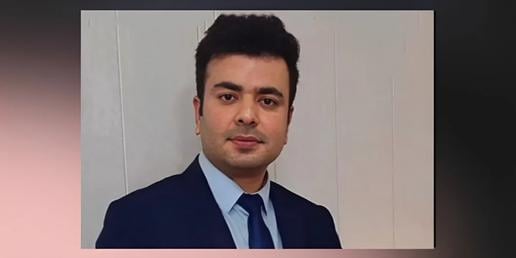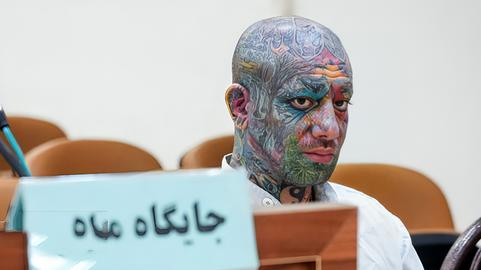
The guests were invited, the cake and the pastries were ordered, arrangements with the flower shop were made, the wedding car was booked, and the stylist had received half of her payment. But Leila and Parham had yet to find a notary who would perform the ceremony and register the marriage. Every notary they had approached had turned down the offer.
Leila looks at her wedding dress box and remembers the day when, after a thousand arguments, she was able to get her parents’ consent to marry Parham. She knows that they accommodated her as much as they could. She would be marrying into a Baha’i family and she would accept their rules for her dowry, but her parents would not accept her marriage without a Muslim ceremony. Parham agreed. “Our prophet said that if you marry a non-Baha’i,” says Parham, “you must first marry in their way and then in the Baha’i way.”
Those who enforce Islamic law in Iran have ruled that a Muslim woman cannot marry a non-Muslim man. So the law applies to Leila. No mullah has agreed to perform the ceremony and officially register the marriage.
In Iran, religious affiliation is not listed on birth certificates, national ID cards, military discharge cards or even graduation diplomas. In a marriage certificate, however, the religion of both husband and wife is declared.
Leila and Parham have also had to deal with another barrier to their marriage: the difference between Muslim and Baha’i customs. For example, depending on the groom’s family’s financial means, Baha’is set the dowry at one to five gold or silver “units”– gold for city people and silver for villagers. When compared to other dowries in today’s Iran, the highest dowry in the Baha’i tradition, five gold units of 19 ounces per unit, is very low.
“It was not very important for my father,” Leila says, “but the question ‘what would people say?’ became their mantra and bothered me the most. In any case, they relented and accepted the five units of gold.”
Perhaps if Parham had converted to Islam none of this would have happened.
“I have never been fanatical about religion,” Leila tells Iranwire. “I believe that religion is a way to live properly. Parham, however, is a real believer in the Baha’i religion. When we talked of marriage, he had two conditions: he would never convert to Islam and, if we were going to have children, they would be brought up as Baha’is. Besides, if Parham converted to Islam, his family would disown him.”
“Then why didn’t you convert to Baha’ism?” I ask. “Because I would either go to prison or face death,” she answers. “Parham doesn’t want to leave Iran and neither do I.”
Democracy At Home
I meet another couple in similar conditions. Benyamin was born to a Jewish family but converted to Islam to marry Azadeh. It is a conversion for appearance’s sake only: he still studies the Torah, fasts and only eats kosher meat. “Democracy rules in my household,” he says. “Azadeh prays and fasts in the Muslim way and I follow the Jewish way. We don’t bother each other over religion.”
Both his family and the Jewish community have disowned Benyamin, who converted to Islam 10 years ago. “In the beginning I went to the temple on Saturday evenings. I noticed that they looked at me in a strange way and would not reply to my greetings. I no longer go there. I have converted a corner of the house to my own temple.”
“Are you happy with your life?” I ask. “Everything is fine,” he replies, “except that I miss my parents and my sister. That is all.”
The Immigration Solution
From the start, Sahar and Robert did not want to stay in Iran. Throughout the time they were getting to know each other and then decided to marry, neither Robert’s Christian family or Sahar’s Muslim family knew anything about it. Instead, Robert and Sahar requested immigration visas from Canada and left when they both received them. They have been married now for two years, but it was a Canadian wedding.
“I would have liked to have had an Iranian marriage,” says Sahar, “but the embassy does not recognize the marriage of a Muslim woman to a Christian man. So we decided to forget about it and only performed the Canadian ceremony.”
Article 1060 of the Iranian Civil Code describes the conditions for the marriage between an Iranian woman and a foreign national as such: “The marriage of a foreign man with an Iranian woman requires that the man convert to Islam and then receive a special permission from the government. Inside the country, the authority to issue this permission rests with the Ministry of Interior. Outside the country, the authority rests with the consular representatives of the Islamic Republic of Iran acting on behalf of the Minister of Interior. This permission is called a ‘permit for matrimony’. After the permit is issued...consular agents register the marriage of Iranians abroad.”
Why are Women Treated Differently?
Of course Islamic law only forbids the marriage of Muslim women to non-Muslim men, whether the men are “people of the book” (officially recognized religions such as Christianity or Judaism) or not (such as Baha’ism). The situation for men, however, is very different. Religious scholars have ruled differently on the marriage between Muslim men and non-Muslim women. They agree that a temporary marriage between a Muslim man and non-Muslim woman from an officially recognized religion is acceptable, though they differ on the issue of permanent marriage. Some scholars permit it and some don’t.
Why is Islam harsher on women than men when it comes to marrying non-Muslims?
When IranWire put this question to the office of Grand Ayatollah Naser Makarem Shirazi, we received the following reply: “Men are less impressionable (especially those living under the Islamic Republic) and when the non-Muslim is weak and has signed a letter of commitment to the Muslim, the man is allowed to marry. But since women are relatively more impressionable, such a marriage is absolutely banned... A women is taught by her husband and the husband must make the wife adopt his religion.”
Despite these hardships, Leila and Parham’s story has a happy ending. For about $400, an authorized notary performed the marriage. “Does the marriage certificate list Parham’s religion as Baha’i?” I ask Leila. “No,” she replies with a laugh. “The husband’s religion is specified as ‘subject to the laws of the Islamic Republic’ but the wife’s religion is listed as ‘Muslim’.”






















comments